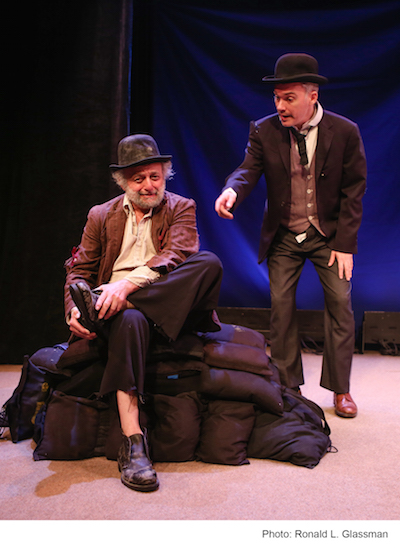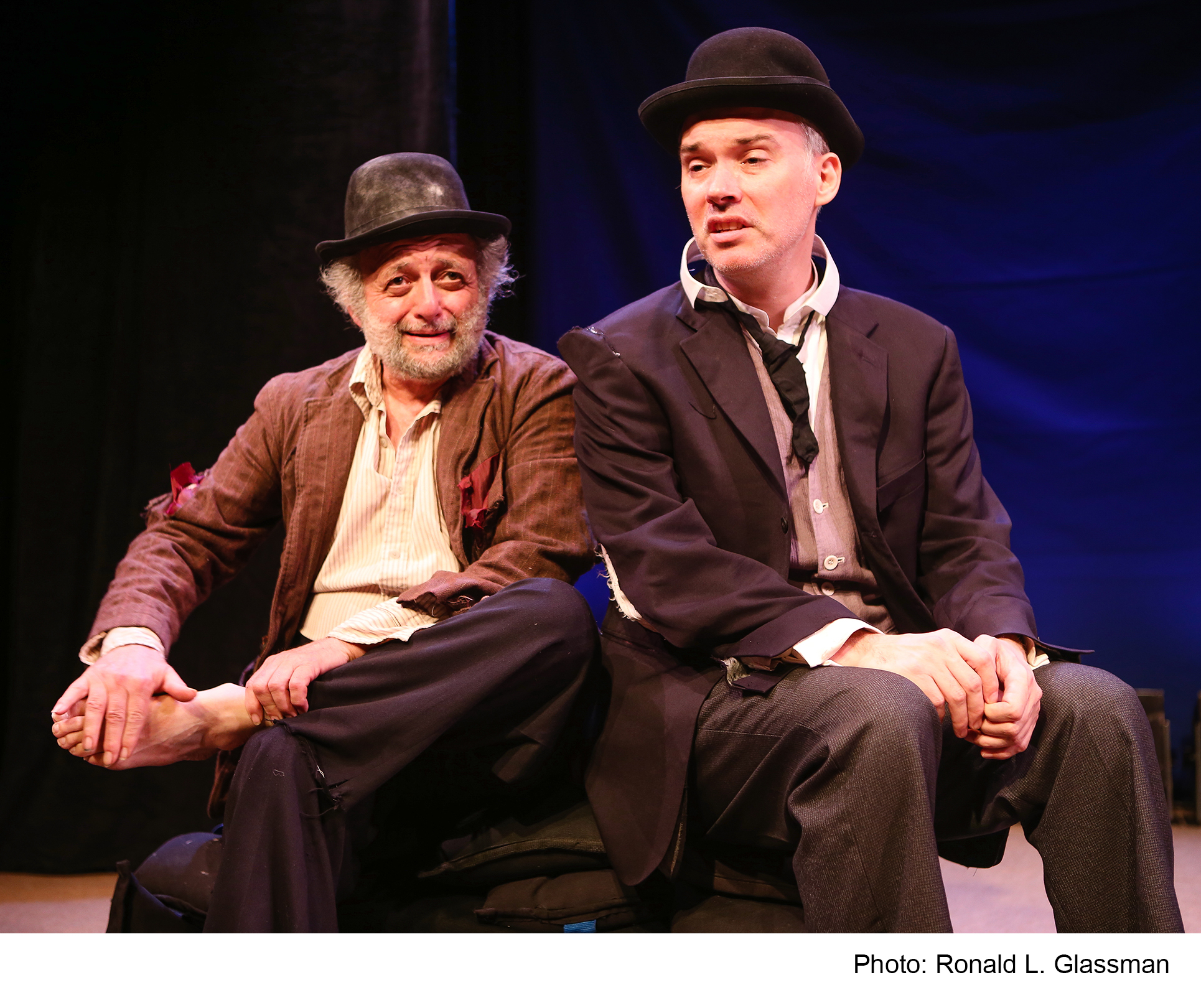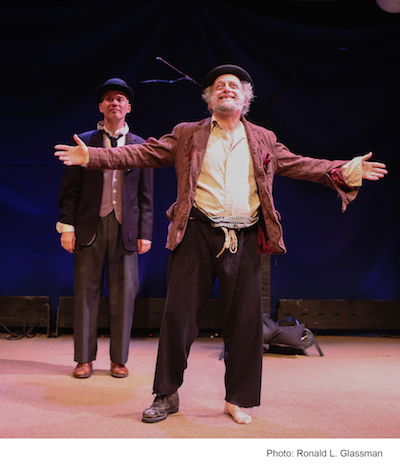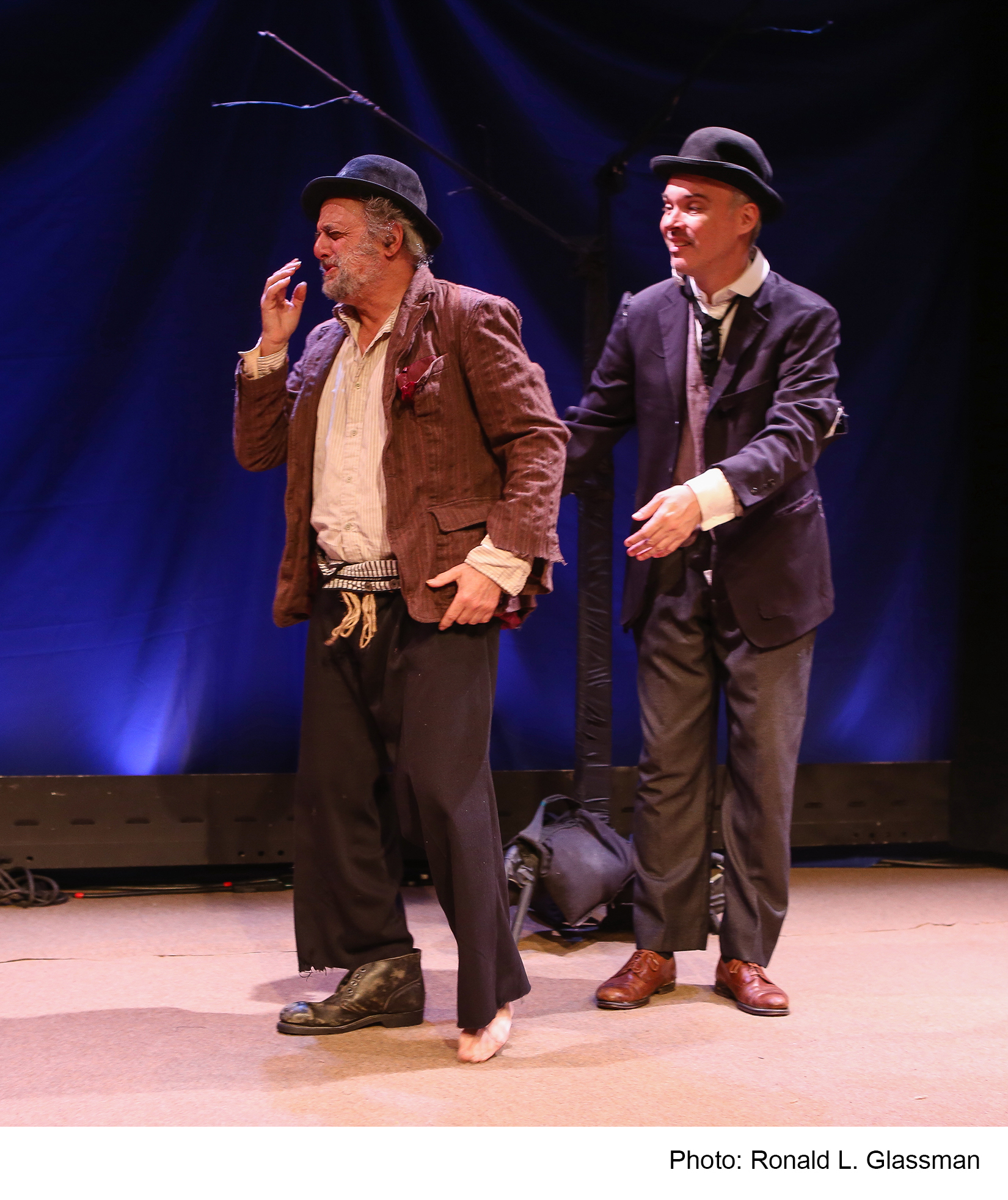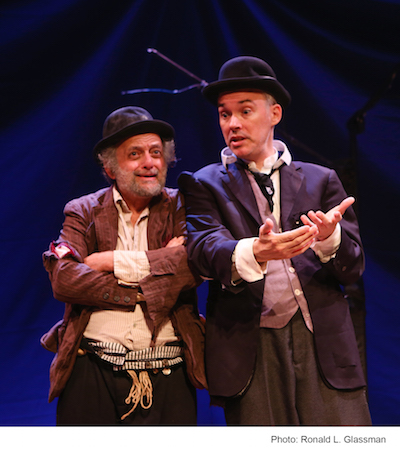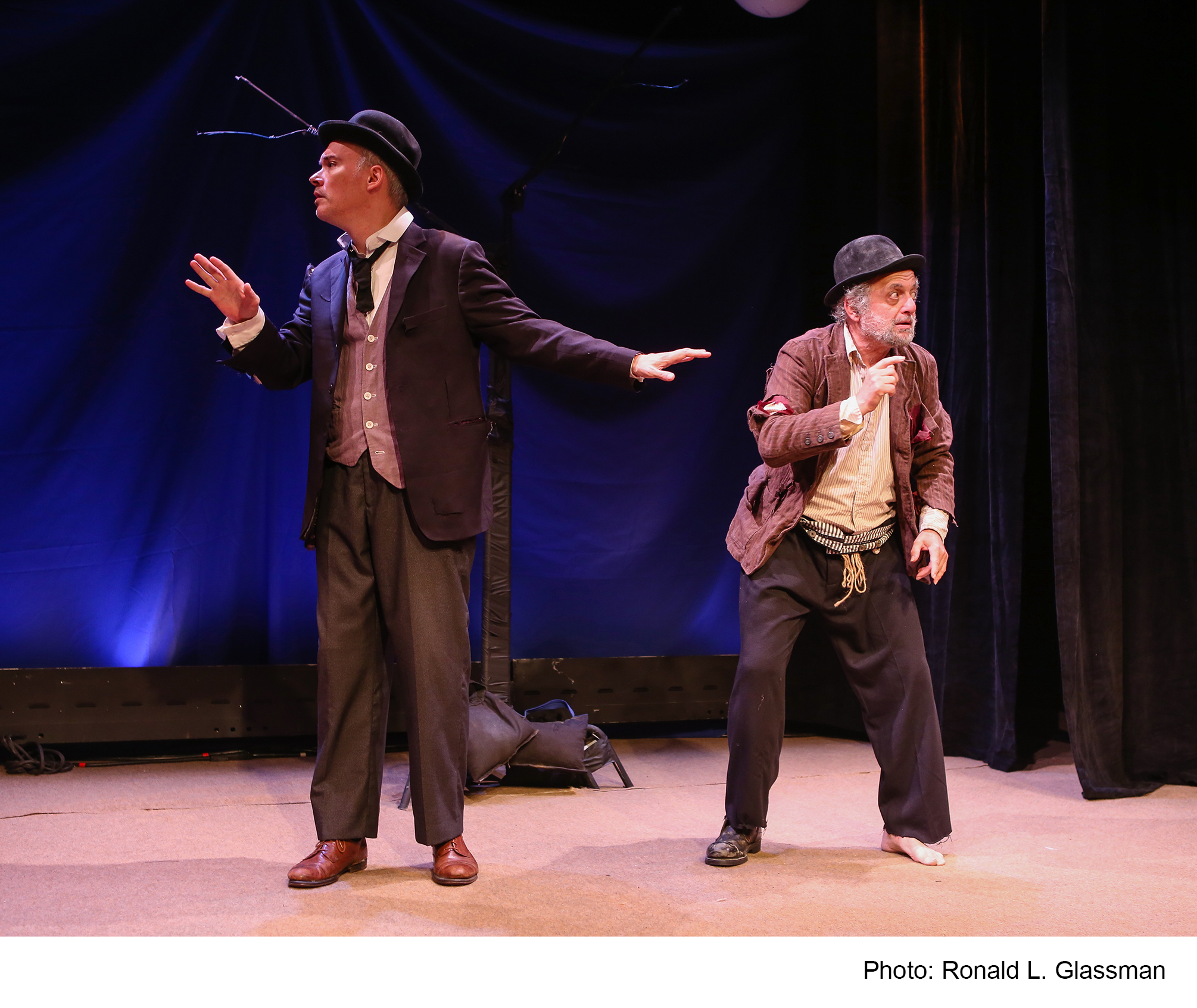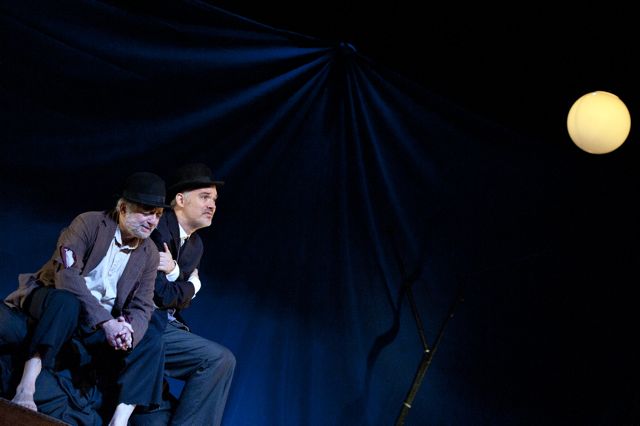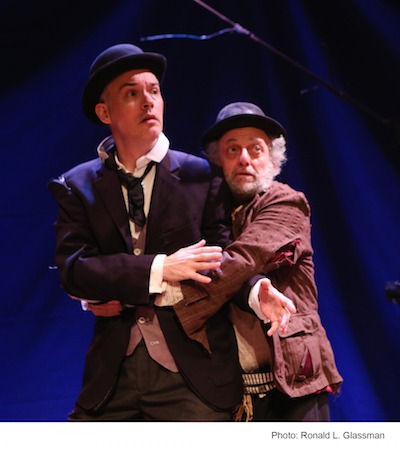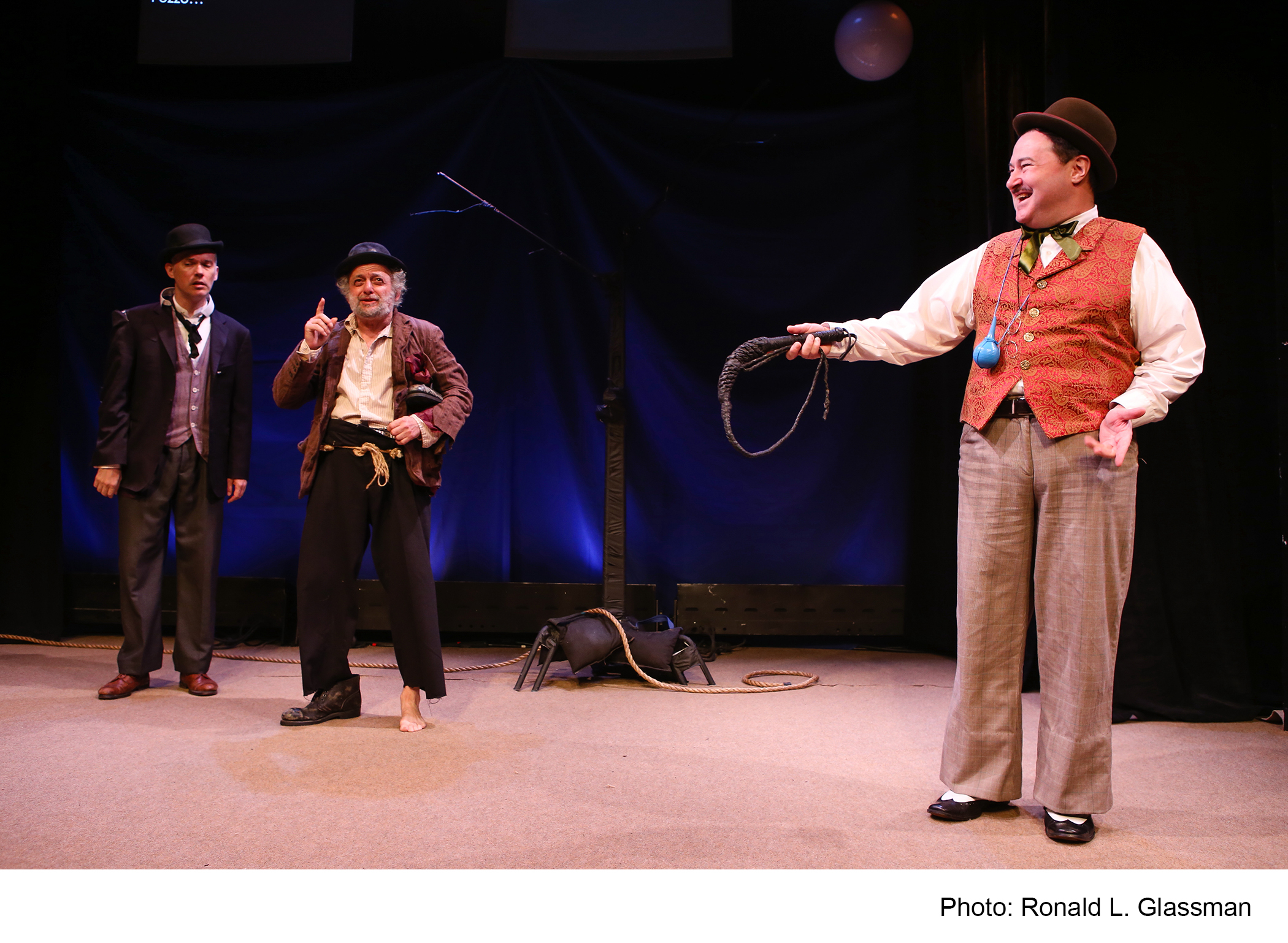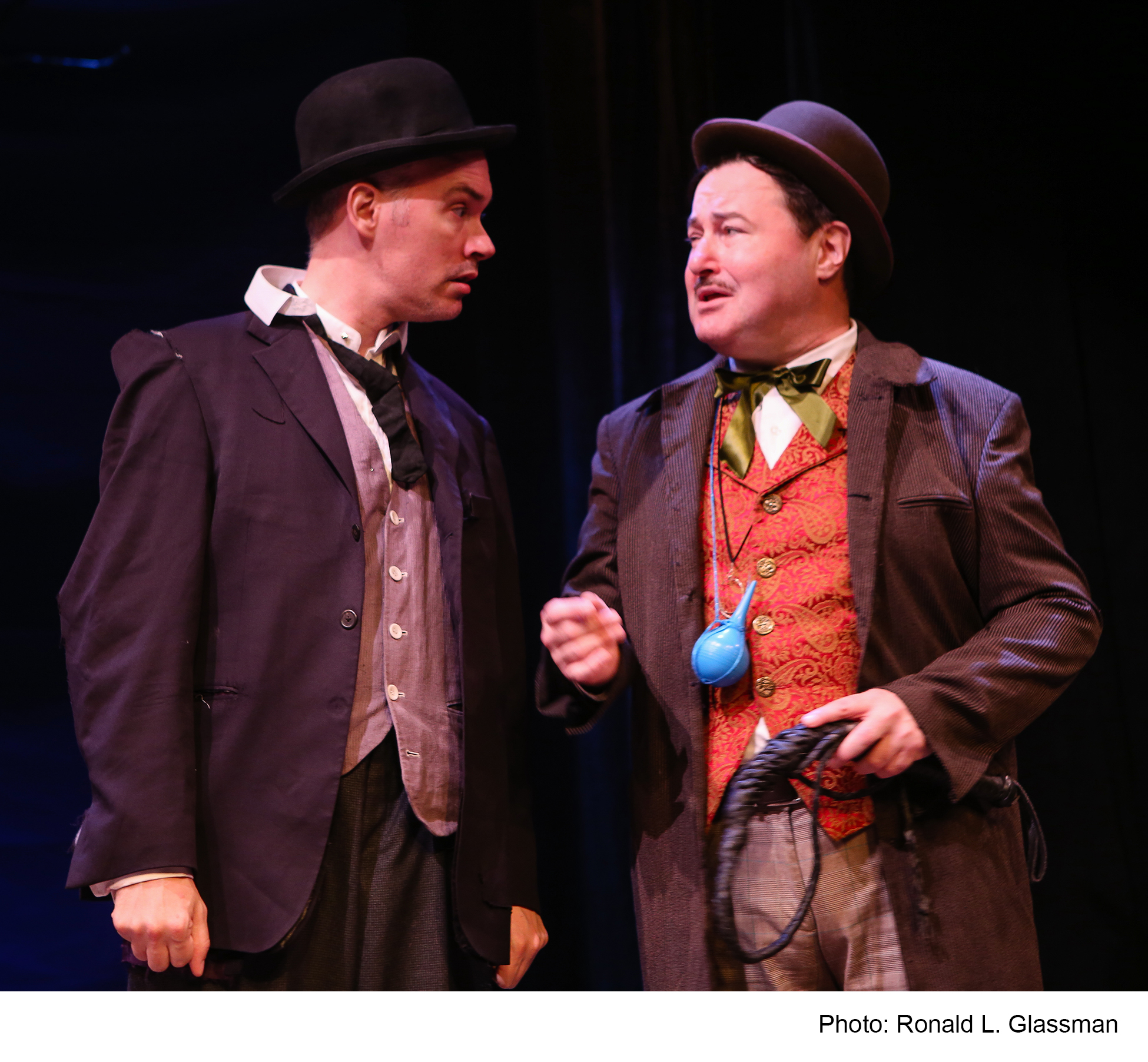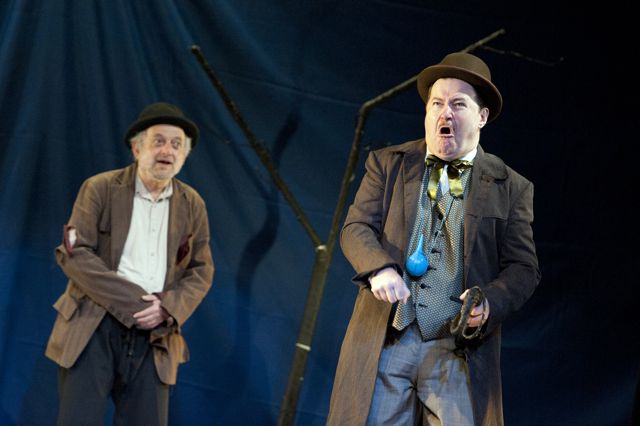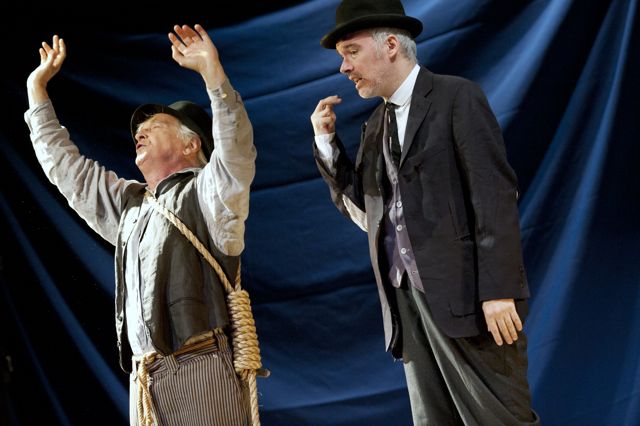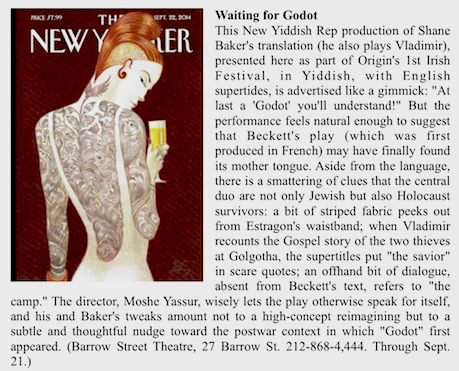
Published March 24, 2016, issue of April 15, 2016
Isaac Segal. Ben Rosenblatt, David Mandelbaum, Shane Baker, Rafael Goldwaser
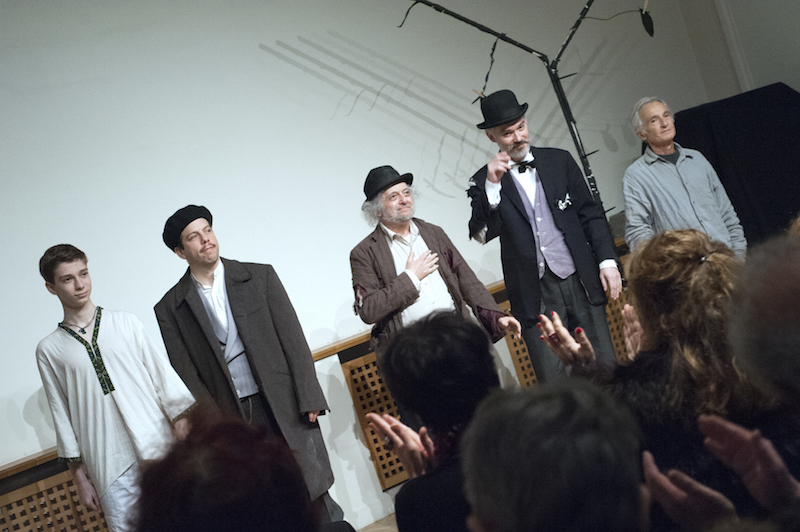
photo:Cordula Treml
„וואַרטן אויף גאָדאָ“
א גרויסער קינסטלערישער אויפֿטו
פֿון יצחק ניבאָרסקי
"Waiting for Godot"
A Great Artistic Achievement
by Yitschok Niborski
Translated by David Mandelbaum
From March 14th to March 21st, the New York based New Yiddish Repertory Theater, presented "Waiting For Godot," Samuel Beckett's most famous play, as part of the”Commencez! Paris Beckett" festival.
Forward readers are already familiar with this piece, staged a couple of years ago by director Moshe Yassur, and performed at a Beckett festival in Northern Ireland in 2014. The play first opened in the French capital in 1952, and is still popular in Paris, often staged by renowned directors and actors.
This Yiddish version is not lacking in comparison with the French productions, and has, besides, it's own particular Yiddish charm.
It isn't easy to digest a play about two forlorn, ragged, hungry people, waiting in some unpleasant, desolate, backwater, for the mysterious Godot, about whom they know nothing other than that he promised to come. Since it's premiere, this harsh, avant-garde work was in the first instance considered scandalous, and was later variously interpreted. Many postulated (despite the authors denial) that the name Godot hints at God, and the content of the piece is metaphysical. In the last ten years, however, based on Beckett's notes and other evidence, critics have leaned towards a political interpretation: the protagonists symbolize refugees, perhaps even persecuted Jews waiting in vain for salvation in a far flung corner of France under Nazi occupation. Nu, if we're taking about refugees, clothing them in Yiddish is like fitting them in their own skin. This Yiddish version, in Shane Baker's outstanding translation, plays as if it were the original. In particular, David Mandelbaum plays Estragon, the physical and spiritual embodiment of the eternally soul-sick being, with such authentic Yiddish geste, in every wrinkle and in every movement, that if one didn't know better one would think that Beckett wrote the role specifically for him. His fellow sufferer Vladimir, more prosaic and self-controlled, is played with great naturalness, by Shane Baker. Even the contrast in dialects between the actors, the "Galitzianer" Mandelbaum, and the "Litvak" Baker, impishly portrays two different personalities, who together depict the despair of the persecuted and homeless.
Although most of the dialogue is carried by these two actors, the equally important role of Lucky, is skillfully and brilliantly portrayed by Rafael Goldwaser. Through mime and movement he brings to life this strange personage, and though he is mute almost throughout, when he does break out into a strange absurdist monologue, it provides one of the high points of the piece. Ben Rosenblatt ably portrays the role of Pozzo, the crazed character that lords it over Lucky. The small role of Godot's messenger is played with appropriate innocence by Isaac Segal. The stage manager Jesse Freedman also did his part in this very successful production. It is interesting to compare New Yiddish Rep's production with the Yiddish version produced last year by Yiddish Spiel in Tel Aviv, translated and directed by Joshua Sobel. Sobel is an important theater artist, and his production, of course, had its good points. But his translation limps along, and he introduces unnecessary elements, so that the piece has a strange aftertaste, despite its successful aspects. The American company, by contrast, offers a "Godot" with a natural, flowing, Yiddish, that resounds with the dark lot of forlorn, hunted people of all times and places.
All of the performances were well attended, many of them overflowing the space at the Centre Culturel Irlandais. where the festival took place. Besides Yiddish speakers, the festival naturally drew a goodly crowd of Beckettians, a portion of whom were curious to see the impact of Yiddish on the masterwork of their beloved playwright. The author of these lines spoke to several of them, and they all praised the authenticity of the piece, in particular it's unfolding of Beckett's theatrical concept.
As to the Yiddish speaking audience, they were truly delighted. It was a shame to get up from one's seat after nearly two hours, during the course of which Beckett's lofty, universal, creation, was so magically intermingled with the joy of the Yiddish word.
פון 14טן ביזן 21סטן מאַרץ איז די טרופּע פֿון ניו־יאָרקער „נײַעם ייִדישן רעפּערטואַר־טעאַטער“ אַרויסגעטראָטן כּמעט טאָג־טעגלעך אין פּאַריז, אין די ראַמען פֿונעם „סעמיועל בעקעט־פֿעסטיוואַל“, מיט „וואַרטן אויף גאָדאָ“, די באַרימטסטע פּיעסע פֿונעם גרויסן אירלענדיש־פֿראַנצייזישן דראַמאַטורגִ.
די לייענער פֿון „פֿאָרווערטס“ ווייסן אַוודאי פֿון דער דאָזיקער פֿאָרשטעלונג, וואָס דער רעזשיסאָר משה יסעור האָט זי געשטעלט אין ניו־יאָרק מיט אַ פּאָר יאָר צוריק. זי איז שוין איין מאָל געשפּילט געוואָרן אויפֿן בעקעט־פֿעסטיוואַל (דעמאָלט אין אירלאַנד) אין זומער 2014. פֿאָרט וועט אײַך זײַן אינטערעסאַנט צו לייענען ווי מע האָט זי אויפֿגענומען אין פּאַריז. איז דאָך די פּיעסע דערשינען, קודם־כּל, דאָ אין דער פֿראַנצייזישער הויפּטשטאָט, אויף פֿראַנצייזיש, אין 1952, און עד־היום קען מען גוט אין פּאַריז בעקעטס אַוואַנגאַרד־ווערק, וואָס ווערן אָפֿט געשטעלט דורך אויסגערופֿענע רעזשיסאָרן און אַקטיאָרן.
טאָ זאָל טאַקע געזאָגט ווערן, אַז די איצטיקע ייִדישע פֿאָרשטעלונג שטייט קינסטלעריש נישט אָפּ פֿון די פֿראַנצייזישע, און דערצו האָט זי נאָך אַ באַזונדערן ייִדישן חן. דאָס האָט צו טאָן מיטן פּירוש וואָס מע מאַכט פֿון בעקעטס כּוונה אין „וואַרטן אויף גאָדאָ“.
ס׳איז דאָך נישט פּשוט צו צעקײַען אַ שפּיל, וווּ צוויי עלנטע, אָפּגעריסענע, אויסגעהונגערטע מענטשן וואַרטן, ערגעץ אין אַן אומהיימלעכן אומבאַוווינטן העק, אויפֿן אָנקום פֿון איינעם אַ מיסטעריעזן גאָדאָ, וועגן וועמען זיי ווייסן גאָרנישט, סײַדן אַז ער האָט צוגעזאָגט נאָך זיי צו קומען. זינט זי האָט זיך באַוויזן, האָט די דאָזיקע האַרבע אַוואַנגאַרדיסטישע פּיעסע אַרויסגערופֿן, אין ערשטן מאָמענט — סקאַנדאַלן, און שפּעטער — די פֿאַרשיידנסטע אויסטײַטשונגען. אַ סך האָבן געדרונגען (כאָטש דער מחבר אַליין האָט עס אָפּגעלייקנט), אַז דער נאָמען „גאָדאָ“ איז אַן אָנצוהערעניש אויף „גאָט“ און אַז ממילא האָט די פּיעסע אַ מעטאַפֿיזישן אינהאַלט. אין די לעצטע צען יאָר אָבער האָט די קריטיק, אויפֿן סמך פֿון בעקעטס כּתבֿ־ידן און אַנדערע סימנים, זיך גענומען אָריענטירן אין דער ריכטונג פֿון אַ פּאָליטישן פּירוש: די העלדן זאָלן סימבאָליזירן פּליטים, און אפֿשר אַפֿילו גערודפֿטע ייִדן, וואָס וואַרטן אומזיסט אויף אַ ישועה אין אַ פֿאַרוואָרפֿענער געגנט פֿון פֿראַנקרײַך אונטער נאַצישער אָקופּאַציע.
נו, ווי באַלד פּליטים — ווערט שוין פֿאַר זיי דער ייִדיש־לבֿוש עפּעס אַזוינס ווי זייער אייגענע הויט. די ייִדישע ווערסיע, אין דער אויסגעצייכנטער איבערזעצונג פֿון שיין בייקער, קלינגט ממש ווי דאָס וואָלט געווען דער אָריגינעלער טעקסט. נאָך בפֿרט אַז דער העלד עסטראַגאָן, דער פֿיזיש און גײַסטיק אייביק צעווייטיקטער מענטש, ווערט געשפּילט דורך דוד מאַנדעלבאַום מיט אַזוי פֿיל ייִדישער אמתדיקייט אין יעדן קנייטש און אין יעדער תּנועה, אַז ווער עס ווייס נישט וואָלט געמעגט שווערן, אַז דאָס האָט בעקעט צוגעשניטן די ראָלע עקסטרע פֿאַר אים. זײַן אָח־לצרה וולאַדימיר — אַן אַנדער טיפּ, כּלומרשט אַ מער באַהערשטער און ניכטערער, ווערט געשפּילט מיט גרויס נאַטירלעכקייט דורך שיין בייקער. אַפֿילו דער צופֿעליקער דיאַלעקטן־קאָנטראַסט צווישן ביידע אַקטיאָרן, דער „גאַליציאַנער“ מאַנדעלבאַום און דער „ליטוואַק“ בייקער, טרעפֿט שטיפֿעריש אַרײַן אין דער געשטאַלטיקונג פֿון צוויי באַזונדערע טיפּן, וואָס צוזאַמען פֿאַרקערפּערן זיי וווּנדערלעך דעם ייִאוש פֿון געטריבענע און היימלאָזע.
כאָטש די דערמאָנטע צוויי אַקטיאָרן טראָגן אויס דעם גרעסטן טייל פֿון די דיאַלאָגן, איז אָבער פּונקט אַזוי וויכטיק די ראָלע פֿון לאָקי, געשפּילט דורך רפֿאל גאָלדוואַסער. גאָלדוואַסער, אַן אַקטיאָר מיט אַ סטאַזש, האָט אַ סך געאַרבעט איבער מימיק און ער באַווײַזט גלענצנדיק צו באַלעבן אָט־אָ דעם מאָדנעם פּאַרשוין, לאָקי, וואָס כּמעט די גאַנצע צײַט איז ער שטום, אָבער ווען ער קריגט שוין לשון, ברעכט ער אויס אין אַ משונהדיקן אַבסורד־מאָנאָלאָג, וואָס איז איינער פֿון די הויפּט־מאָמענטן אין דער פּיעסע.
אין דער ראָלע פֿון פּאָצאָ, דעם דעספּאָטישן משוגעוואַטן פּאַרשוין וואָס געוועלטיקט איבער לאָקין, צייכנט זיך אויס בן ראָזענבלאַט. דער יונגער אײַזיק סיגל שפּילט מיט דער נייטיקער תּמימות די קורצע ראָלעס פֿונעם פֿאַרבאָרגענעם גאָדאָס יונגע שליחים. דער בינע־פֿאַרוואַלטער דזשעסי פרידמאַן האָט אויך זײַן חלק אין דעם זייער געלונגענעם ספּעקטאַקל.
אינטערעסאַנט איז צו פֿאַרגלײַכן דאָס ייִדישע „וואַרטן אויף גאָדאָ“ פֿונעם „נײַעם ייִדישן רעפּערטואַר־טעאַטער“ מיט דער אַנדערער ייִדישער ווערסיע פֿון דער זעלבער פּיעסע, וואָס די טרופּע „ייִדישפּיל“ האָט פֿאַרגאַנגענעם יאָר געשפּילט אין תּל־אָבֿיבֿ, איבערגעזעצט און רעזשיסירט דורך יהושע סאָבאָל. סאָבאָל איז אַ וויכטיקער טעאַטער־קינסטלער און זײַן אויפפֿירונג האָט פֿאַרשטייט זיך אויך געהאַט גרויסע מעלות. אָבער זײַן איבערזעצונג האָט היפּשלעך אונטערגעהונקען. דערצו האָט ער אַרײַנגעפֿירט געוויסע אומנייטיקע צוגאָבן, און דאָס גאַנצע האָט געהאַט אַ פֿרעמדלעכן נאָכטעם, נישט געקוקט אויף די געראָטענע אַספּעקטן. די אַמעריקאַנער טרופּע, אין קעגנטייל, גיט אַ „גאָדאָ“ אַ געלויפֿיקן, אַ נאַטירלעך ייִדישן, מיטן גאַנצן ביטערן אַבסורד־הומאָר אין וועלכן עס קלינגט אָפּ די פֿינצטערע דאָליע פֿונעם עלנטן, געיאָגטן מענטשן פֿון אַלע צײַטן און ערטער.
אויף אַלע פֿאָרשטעלונגען איז געקומען אַ שיינער עולם; אויף עטלעכע פֿון זיי — מער ווי עס האָט געקענט אַרײַננעמען דער זאַל פֿון אירלענדישן קולטור־צענטער, וווּ דער פֿעסטיוואַל איז פֿאָרגעקומען. נישט בלויז ייִדיש־קענערס זענען געקומען. דער פֿעסטיוואַל האָט ווי געוויינטלעך צוגעצויגן אַ היפּשע צאָל חסידים פֿון בעקעטס טעאַטער, און אַ טייל פֿון זיי זענען געווען טשיקאַווע צו זען, וואָס פֿאַר אַ פּנים עס האָט דאָס קרוינווערק פֿון זייער באַליבטן דראַמאַטורג דווקא אויף אַזאַ אויסטערלישער שפּראַך, ייִדיש. דער שרײַבער פֿון די שורות האָט געשמועסט מיט אייניקע פֿון זיי. אַלע האָבן אויסגעלויבט די עכטקייט פֿון דער שפּיל און זי בפֿירוש באַצייכנט ווי אַ גאָר געראָטענע פֿאַרווירקלעכונג פֿון בעקעטס טעאַטער־קאָנצעפּציע.
וואָס שייך דעם עולם וואָס פֿאַרשטייט ייִדיש, איז ער זיך ממש מחיה געווען. ס׳איז פּשוט געווען אַ שאָד זיך אויפֿצוהייבן פֿונעם בענקל נאָך די קוים צוויי שעה, וואָס אין זייער פֿאַרלויף האָט זיך בעקעטס הויכע אוניווערסאַלע שאַפֿונג אַזוי מופֿתימדיק צונויפֿגעגאָסן מיט דער פֿרייד פֿון ייִדישן וואָרט.

The 'Godot' We've All Been Waiting For
by Ezra Glinter
October 3, 2013
On a recent Friday evening, I was sitting in Manhattan’s Castillo Theatre, on West 42nd Street, waiting to see a production of Samuel Beckett’s “Waiting for Godot.”
As the house lights went down, and the stage lights went up, the play’s minimalist set came into view: a low mound and a bare tree that looked more like a metal sculpture than like a living thing. On the mound sat David Mandelbaum as the rundown Estragon, wearing a misshapen hat and a pair of torn trousers held to his body by a rope belt. Shane Baker, playing the slightly more decorous Vladimir, stood nearby. As Estragon wrestled with his boot, trying to pull it off his swollen foot, he moaned, “Me ken goornisht teeee-yen.”
Anyone familiar with Beckett’s masterpiece, now celebrating the 60th year since its premiere at Paris’s Théâtre de Babylone, would recognize that famous first line, “Nothing to be done.” The difference was that, like the rest of this performance, it was said in Yiddish.
There’s a lot that’s perfect about doing “Waiting for Godot” in Yiddish, even if we needed this production, directed by Moshe Yassur for New Yiddish Rep, to make us realize it. Through Baker’s translation and the cast’s performances — Mandelbaum and Baker outdo themselves as the existential odd couple of Estragon and Vladimir, as does Avi Hoffman as the blustering Pozzo and Raphael Goldwasser as his masochistic slave, Lucky — the New Yiddish Rep has created a distinctive work that possesses its own power while shedding new light on the original.
Yiddish, of course, is not just a language spoken by Jews, but also a language bound up with Jewish life and tradition. Thus, translating “Godot” (or anything else) into Yiddish means relocating it into a universe of Jewish reference and idiom. Here, for example, “His highness” becomes “Der rebbe reb Tsots,” and “critic” (flung as an insult by Estragon to Vladimir) becomes “misnaged.”
And when Vladimir remonstrates with Pozzo over the latter wanting to get rid of Lucky, the original comparison of chucking away Lucky “like a banana skin” becomes “shlogn kapores mit im” — that is, discarding him like the sacrificial chicken swung around the head before Yom Kippur.
The performance also locates the play within a Yiddish world through the speech and mannerisms of the actors. While Estragon speaks an earthy Polish Yiddish, Vladimir has a more refined Lithuanian accent, giving the characters’ interactions a “tomayto/tomahto” comedy. Estragon, trying to figure out what day of the week it is (and when Godot might or might not arrive), employs the singsong tune traditionally used to work out a knotty bit of reasoning in the Gemara.
Most spectacular is when Lucky is instructed to “think” and embarks on a rapid-fire nonsense disquisition, delivered here with a grandiose Yom Kippur melody.
What all this adds to Beckett’s play, however, is a more difficult question.
Brooks Atkinson, reviewing “Godot” for The New York Times in 1956, paraphrased Churchill describing Russia in saying that the play is “a mystery wrapped in an enigma.” Does rendering it into Yiddish make it less enigmatic? And if so, is that a good thing?
According to Mandelbaum, the troupe originally wanted to present the characters as Holocaust survivors in the immediate aftermath of World War II. It’s an understandable inclination, especially since Beckett, who was a member of the French Resistance, wrote the play in 1948 and ’49, and his work expresses the existential anguish of the time.
Fortunately, however, the Beckett estate nixed the idea. Despite the postwar resonance, the power of the play lies in the maddening interplay between specific references to the world we know and a nowhere quality that puts it in a kind of purgatory beyond time and space. Moving the action to a more concrete historical setting would have vitiated that hanging-in-thin-air torment, even if the historical moment was itself the hanging-in-thin-air torment of a displaced persons camp.
Even without any overt indication, Yiddish brings out this aspect of the play. Indeed, when Vladimir asks, “Where are all these corpses from?” and exclaims: “A charnel house! A charnel house!” or when both Vladimir and Estragon speak of the noise of dead voices, and how the dead “talk about their lives,” it’s impossible to think of anything else. If this makes the play more concrete, it is not by adding anything extra, but by revealing the inference contained in Beckett’s words themselves.
After the performance, a friend asked me, “So, does Yiddish theater have a future?” Trying to make a joke, I said something about having to “wait and see.” But the truth is, if the future of Yiddish theater means more shows like this one, that’s a tremendously good thing. While much Yiddish theater today — or, more frequently, Yiddish theater in English translation — focuses on mining the existing Yiddish canon, New Yiddish Rep has done something much more audacious. With “Waiting for Godot,” it has shown not what the Yiddish language has contributed to theater in the past, but what it is still able to contribute today. And that is well worth waiting for.
Village Voice
By Danny King
In 2013, the New Yiddish Rep was the recipient of tremendous critical acclaim for its Yiddish-language production of Samuel Beckett's Waiting for Godot at the Castillo Theater. This was partly a result of the organic symbiosis between the existential despair of Beckett's play and the wandering nature of the Yiddish language itself: As Anita Gates offered in her review for the New York Times, "You think Waiting for Godot is depressing? Wait till you hear it in Yiddish." This fall, the company applied similar logic in staging a Yiddish-language production of another landmark play about alienated, meandering souls — Arthur Miller's Death of a Salesman — but on this week of Christmas, the NYR revisits its take on Godot for a brief, short-stint holiday run. Much of the original talent returns here: Shane Baker (who also translated the play) as Vladimir, David Mandelbaum (the company's founder and artistic director) as Estragon, and Moshe Yassur in the director's seat. If you missed the production during its previous run, don't skip on this chance.


